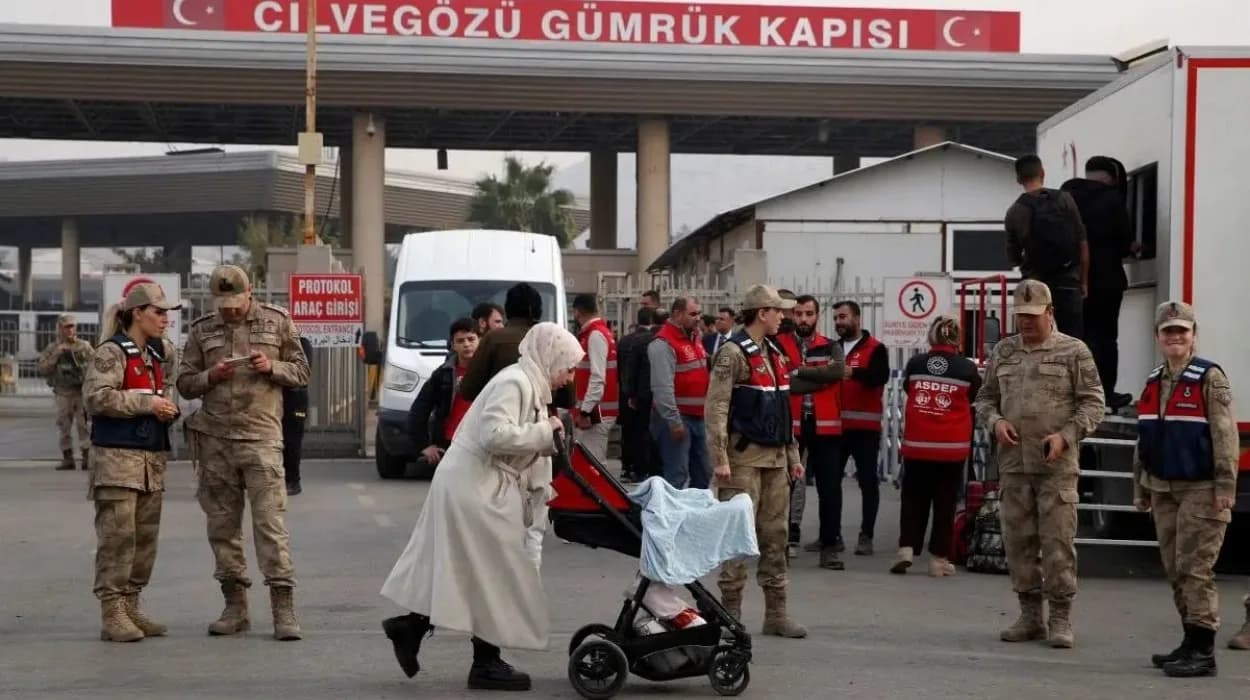Turkey’s Interior Minister Ali Yerlikaya announced that
509,387 Syrian refugees have voluntarily returned to Syria since President
Bashar al-Assad fled in December 2024 and a new government took power. This
number is part of a wider trend, with approximately one million Syrians
returning from neighbouring countries since Assad’s fall, as reported by the
United Nations.
Turkey Reports Over 500,000 Syrians Returned Since Assad’s Fall
On Monday, September 29, 2025, Turkish Interior Minister Ali Yerlikaya stated that a total of 509,387 Syrians have crossed back into Syria through Turkey’s voluntary return process following the fall of Bashar al-Assad’s regime in December 2024. In a post on the social media platform X, Yerlikaya said,
“Türkiye continues to stand by Syrians during their voluntary return,”
adding that the pace of returns has accelerated due to recent changes
inside Syria.
The returns are centrally coordinated through designated
hubs, most notably the Voluntary Return Coordination Center located in Sarıçam
district of Adana province in southern Turkey. Here, refugees complete
necessary paperwork before departing. Yerlikaya highlighted this centre as a
model for managing the logistics involved in the returns.
Since 2016, Turkey has facilitated the voluntary return of nearly 1,250,000 Syrians. Turkey currently hosts roughly 2.7 million registered Syrian refugees, according to official data released in May 2025, maintaining its status as the largest Syrian refugee host since the civil war began in 2011.
UN Highlights One Million Syrians Returned to Homeland
The United Nations High Commissioner for Refugees (UNHCR)
has reported that since the fall of the Assad regime on December 8, 2024, one
million Syrian refugees have returned to their country from neighbouring
states, including Turkey, Lebanon, Jordan, Iraq, and Egypt. Of these, about
419,000 returned specifically from Turkey.
The UNHCR further notes that an additional 1.8 million internally displaced Syrians have returned to their original homes within Syria since Assad’s departure, bringing hope for stability and reconstruction under the new administration led by President Ahmed al-Sharaa in Damascus.
However, the UN agency cautions about the immense challenges
facing returnees, such as damaged homes, wrecked infrastructure, weak essential
services, limited job prospects, and ongoing security concerns. These factors
are affecting the pace at which Syrians are able to rebuild their lives.
Turkey’s Role in Managing Voluntary Returns
Turkey’s voluntary return process is designed to be orderly
and dignified. Syrians who want to return must schedule appointments through
provincial migration management directorates via a dedicated website, where
they receive return forms, travel permits, and any necessary consent letters.
Once registered, Syrians travel to the coordination centres
with their belongings and board buses to border crossings including Hatay’s
Cilvegözü, Kilis’ Öncüpınar, and Şanlıurfa’s Akçakale districts. At the border,
returnees undergo fingerprinting and customs checks before crossing into Syria,
where Syrian authorities welcome them. The coordination centres also provide
various gifts and support to children and families during the process.
Turkish officials emphasise that returns are voluntary and that the government continues to provide support for Syrians considering going home. The Sarıçam hub is highlighted as a key operational centre to ensure that all procedures are conducted smoothly and safely.
Voices of Returnees
Personal accounts reflect a mix of hope and cautious
optimism. Ten-year-old Nurtaç Davut, returning with his family, said he felt
well in Turkey and was grateful for the country opening its doors to Syrians.
He also brought his adopted cat with him back to Syria, highlighting personal
dimensions of the return flow.
Ömer Zivane, a Syrian who lived in Turkey for 13 years, expressed excitement and hope about rebuilding his life back home, acknowledging the support he received in Turkey and his intention to contribute to Syria’s development with what he learned abroad. Similarly, eight-year-old Rosim Davut voiced happiness about returning while expressing affection for her school in Turkey.
Syrian Context and Ongoing Challenges
The fall of Bashar al-Assad’s regime on 8 December 2024
marked a significant political shift in Syria. Since then, Ahmed al-Sharaa’s
government has pursued reconstruction and stability across the war-torn
country. However, many areas still face security risks due to unresolved
conflicts, unexploded ordnance, and ongoing threats.
International organisations, including the UNHCR, continue
to monitor the situation closely, urging that all returns must be voluntary,
safe, and dignified. The humanitarian situation remains complex, with over
seven million Syrians still displaced inside the country and more than 4.5
million refugees abroad according to the latest UN figures.
Diplomatic and Institutional Developments
Turkey’s embassy in Damascus reopened in mid-December 2024,
coinciding with renewed diplomatic engagement following Assad’s exit. Plans are
underway to establish migration management offices in Syrian cities such as
Aleppo, where many refugees originally came from, aiming to facilitate smoother
returns and cross-border coordination.
Turkey’s ongoing coordination with international agencies and Syrian authorities highlights the importance placed on managing the refugee crisis amid evolving political and security landscapes in the region.
